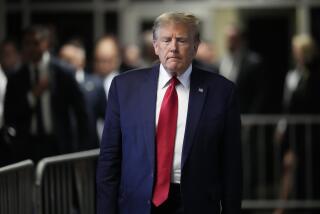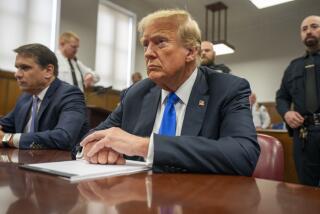Trump University trial goes on in San Diego despite election result
In less than three weeks, the class-action lawsuit against Donald Trump and his defunct Trump University is set to go to trial in a downtown San Diego courtroom.
That probably won’t change, even with Trump’s presidential win on election night, legal experts say. However, it could alter how personally involved Trump will be in the federal trial, in which he must defend accusations he misled and defrauded students who enrolled in his real estate academy.
Attorneys for both sides are scheduled to be in court Thursday afternoon to finalize preparations before jury selection begins on Nov. 28. The election results and their potential effect on the case will probably dominate the courtroom discussion and draw a large media presence.
Trump’s attorneys did not return phone calls and emails seeking comment Wednesday, and lawyers for the former students who filed the case declined to discuss the case.
As unusual as this situation is, the U.S. Supreme Court has set legal precedent when it comes to lawsuits against presidents, and that precedent is likely to dictate how Trump’s case proceeds.
In 1994, former Arkansas state employee Paula Jones sued then-President Bill Clinton on accusations that he made sexual advances on her when he was governor.
Clinton fought the sexual harassment lawsuit. The case made it to the Supreme Court, which ruled that sitting presidents can be sued for events that happened before they took office or are unrelated to their presidential duties.
“Clinton v. Jones established that a president does not have absolute immunity,” attorney Robert S. Bennett, who argued on Clinton’s behalf to the Supreme Court in 1997, said in an interview Wednesday.
The ruling also said presidents don’t have the right to delay such a lawsuit just because they are in the Oval Office.
While the Clinton case only applies to sitting presidents, Bennett doesn’t think Trump’s status as president-elect will make much of a practical difference in the looming trial, especially given the possibility that the trial will not have concluded by his Jan. 20 inauguration date.
Still, legal experts expect Trump’s attorneys to ask for the trial to be delayed until he leaves the White House, citing how busy he will be. But such a request would not be expected to succeed, the experts say.
“I think the likelihood of the trial getting delayed is very low. If it is delayed, it’s delayed for four years presumably, if not longer,” said Shaun Martin, a University of San Diego School of Law professor who teaches civil procedure.
“If anything is going to happen [with this trial], it’s going to happen now. The advantage of it happening now is that he’s not president yet,” Martin said.
That the 6-year-old lawsuit is so close to trial also makes it more likely to proceed as scheduled. U.S. District Judge Gonzalo Curiel, who will be presiding over the trial, has been reluctant to grant any more delays.
Bennett said case management, which was one of the major points made in the Clinton ruling, will be key here.
“It will be up to the court to manage the schedule vis-à-vis the new president’s time,” Bennett said.
In the lawsuit, filed in 2010, students allege they paid up to $35,000 to attend seminars and learn inside secrets to success in real estate from mentors who were “handpicked” by Trump. Instead, they claim, the program was nothing more than an infomercial trying to squeeze money out of students, and they did not learn what was promised.
Trump has pointed to a large number of students who gave the program positive reviews and blamed the plaintiffs’ lack of success on laziness and the downturn in the real estate market.
The trial is set to unfold in two parts. In the liability phase, expected to last four to six weeks, the evidence will mostly revolve around whether Trump University misled students by using the term “university” and claiming that Trump “handpicked” the instructors. If he loses, then the damages phase would begin, in which every eligible class member from California, Florida and Texas might have to be considered separately as to how much they were damaged and what they are owed.
Trump has said previously he plans to testify in person, but his new presidential status might change that.
Assuming the trial goes on as scheduled, Trump’s attorneys could ask the judge to excuse him from having to testify and instead show jurors video from his previous depositions in the case.
If the plaintiffs argue that they didn’t get to ask Trump all their questions, then the judge could allow a final deposition before trial, or ask him written questions which he must answer under oath.
Trump could also testify via live video feed.
One thing is clear: Judge Curiel will have a great deal of discretion on how the case proceeds and unfolds in his courtroom.
During the presidential campaign, Trump complained that Curiel had been unfair in rulings against him in the case, saying the judge’s Mexican heritage made him biased against Trump, who supports tough immigration policies and the construction of a wall on the U.S.-Mexico border. Curiel was born in Indiana to Mexican immigrants.
“Judge Curiel really can do whatever he wants,” law professor Martin said. “This is an issue very much within his discretion, which makes it interesting, given the vitriol directed his way.”
“On the one hand, he might bend over backward to prove he’s being fair and give Trump a break here, or he might not be inclined to give him a break,” Martin said.
Attorneys for both sides are also waiting for Curiel to issue rulings on several motions, most of them having to do with what will and will not be permitted as evidence.
One area that Trump’s lawyers do not want in front of a jury are any of the comments he made during his campaign, including anything from public speeches, media interviews, debates or his Twitter account.
“Before trial begins in this case, prospective members of the jury will have the opportunity to cast their vote for president,” Trump attorney Daniel Petrocelli wrote in an Oct. 20 motion. “It is in the ballot box where they are free to judge Mr. Trump based on all this and more. But it is in the jury box where they must judge him and this case only on evidence and argument relevant to the issues at hand.”
Trump also could decide to settle the lawsuit before the trial. Although the outspoken tycoon might not seem the settling type, he has settled many past lawsuits brought against him in business dealings.
Martin said there are many reasons for both sides to want to accept a compromise instead of risking an unfavorable jury verdict.
“If the parties were both rational and intelligent, this case would probably settle, but not every case is resolved rationally. Each side may overvalue its chances of success. That’s generally how things get to trial,” he said.
The makeup of San Diego’s population will be an important factor when it comes to picking a jury, experts said. Trump received 39% of the vote in San Diego County to Democrat Hillary Clinton’s 56%.
“He may think he’s on a winning streak, but he’s got to remember that members of the jury are coming from San Diego, and he’s not riding a winning streak in respect to them,” Martin said. “I’m sure his lawyers will advise him not to be too cocky about the [election] results, given the demographics of a San Diego jury don’t mirror necessarily the electorate across the nation.”
This is not the only lawsuit Trump faces as he heads into office. A second class-action suit regarding Trump University has been filed against him in San Diego, and a similar lawsuit is pending in New York.
Dozens of suits related to his other business interests also have been filed. But because he doesn’t play a central role in many, the suits will likely be handled by his legal team without involving him too much personally, Martin said.
Davis writes for the San Diego-Union Tribune.
ALSO
Trump win sparks student walkouts and protests across the U.S.: ‘I expected better’
Car thieves spoke of Trump and made hateful comments about Muslims in San Diego robbery, police say
‘He is the face of the country but we are the country.’ Students and teachers react to Trump’s win
More to Read
Sign up for Essential California
The most important California stories and recommendations in your inbox every morning.
You may occasionally receive promotional content from the Los Angeles Times.










